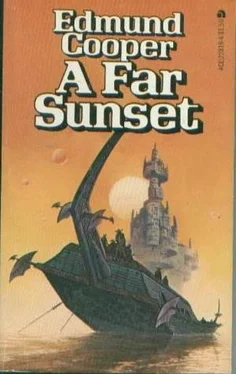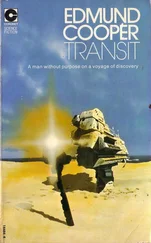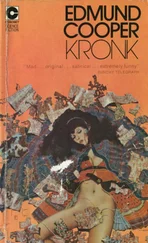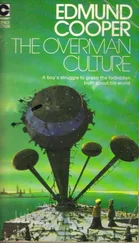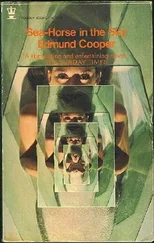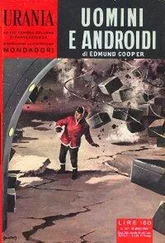‘I have heard,’ said Shah Shan, smiling, ‘that Enka Ne permitted you to keep all that was found with you. They were things which the god-king found interesting but of no practical value. Is there anything among these things that would lend weight to the wonders of which you speak?’
Poul Mer Lo hesitated. There was the atomic powered miniature transceiver—the most he could raise on it would be static. There was the electronic wristwatch, a beautiful instrument but lacking, perhaps, the dramatic quality he needed to convince Shah Shan that he spoke the truth.
And there was the sweeper rifle. The ace that he had sworn only to use in extremity.
Should he risk throwing the ace away? He looked at Shah Shan, a boy filled with curiosity and a turmoil of strange new notions. Poul Mer Lo made his decision.
‘Stay here,’ he said. ‘I will bring you something that is both wonderful and terrible.’
He went into the house, took the sweeper rifle from the niche he had made for it and returned to the verandah.
‘This,’ he said, ‘is a weapon that, if it is used properly could kill half your people.’
Shah Shan looked at the small plastic and metal object uncomprehendingly.
‘Observe,’ said Poul Mer Lo. He stood on the verandah, raised the rifle to his shoulder, pushed the breeder button and sighted at the base of a large tree about a hundred metres away. He pressed the trigger.
There was a faint whine, and the rifle vibrated almost imperceptibly. At the base of the tree, a plume of smoke began to rise. Then the tree toppled over.
‘Observe,’ said Poul Mer Lo. He switched his aim to a clear stretch of water on a waterway that was about two hundred metres away. He pressed the trigger. The water began to stream, then boil, then produce a miniature waterspout.
‘Observe,’ said Poul Mer Lo. He aimed at the ground not far from the verandah and blasted a small crater in which the lava hissed and bubbled long after he had put the rifle down.
Shah Shan put out a hand and touched the weapon gingerly. ‘Truly, it is the work of gods,’ he said at last. ‘How many have you destroyed with it?’
Poul Mer Lo smiled. ‘None. There has been no cause.’
‘It shall be remembered,’ said Shah Shan. Then he, too, smiled. ‘But it did not save you from the darts of the hunters, did it?’
‘No, it did not save me from the darts of the hunters.’
‘That, too, must be remembered,’ said Shah Shan. He rose. ‘My lord, you have given me kappa, you have nourished my spirit, you have shown, perhaps, that my friend is not entirely mad. Oruri is our witness … I will go now, for time runs swifter than water. And for many there is much thinking to be done. Live in peace, friend of my friend … The fingers did not cause too much pain?’
‘It is over,’ said Poul Mer Lo briefly. ‘It was a small price.’
Shah Shan formally touched his lips and his eyes, then turned and went down the verandah steps.
Poul Mer Lo watched him make his way towards the sacred city.
Without speaking, Mylai Tui picked up the empty kappa bowl and the sweeper rifle and took them away.
There had been many discussions aboard the Gloria Mundi about the possibility, probability and variety of extra-terrestrial life. During the first three months of the voyage, before any of the twelve crew members had been suspended, the discussions tended to take place on the mess deck after dinner, or in the library. During the last three months of the voyage they tended to take place in the astrodome. But during more than nineteen years of star-flight, when only one pair was operational at a time, the favourite place for discussion was the navigation deck. It was there that the ship’s log was kept up to date. It was there that diaries were written and letters ‘posted’ for successive pairs so that the month-long vigil would not be too lonely.
It was there that in the seventeenth year of star time, Paul and Ann Marlowe held a champagne and chicken supper to celebrate their successful triumph over the first meteor perforation of the entire voyage. It had not been a very big meteor —less than an inch in diameter—but it had passed with a musical ping clean through the hold of the Gloria Mundi , leaving what looked like two neat large calibre bullet holes on each side of the ship’s hull.
As soon as the air pressure dropped the alram bells began to ring. Paul and Ann, mindful of basic training, immediately dashed to the nearest pressure suits and were fully encased long before they were in any danger of explosive decompression. It took them barely five minutes to trace the leaks and another fifteen minutes to process the self-sealer strips and make a chemical weld. Then Paul covered the emergency plugs with two slabs of half-inch titanium, and the crisis was over. It had not been a big crisis really, but it was a good excuse to open one of the bottles of champagne. After he had made a brief statement in the log, Paul scribbled a note to the French pair, who were next on watch. It read: Since we saved you from a fate worse than freezing, we feel entitled to broach a bottle of the Moet et Chandon ’ll. I believe it was a very fine year … Don’t be too envious. We really had to work for it. Paul.
And so it came about that he and Ann were sitting at table on the navigation deck with the Moet et Chandon in a makeshift ice bucket and Altair on the other side of the paraplex window, more than two light years away and looking like a fiery marble.
‘Suppose,’ said Paul, after his second glass, ‘we came upon a world that was nothing but water. Not a bit of land anywhere. What the hell would we do?’
Ann shook her dark hair and giggled. She had never been much given to alcohol, and the champagne had gone to her head. She hiccupped gravely. ‘That’s easy. Go into low orbit and drop a couple of skin divers complete with aqualungs to look for intelligent sponges.’
There was a brief silence. Then Paul said tangentially: ‘It’s an odd thing, but I’ve never been quite sure whether or not I believe in God.’
‘What is God?’ demanded Ann. ‘What is God but an extension of the ego—a sort of megalomania by proxy?’
Paul laughed. ‘Don’t mix it with me, dear, in the field of psychological jargon. You’re only a gifted amateur. I’m a hardened professional.’
‘Well, what the hell has God got to do with intelligent sponges?’ demanded Ann belligerently.
‘Nothing at all … Except that if God exists he might just possibly have a sense of humour far more subtle than we bargain for. He might have created intelligent sponges, moronic supermen, parthenogenetic pygmies, immortal sloths or sex-crazed centipedes just for kicks—or just to see what them crazy mixed-up human beings would do when they encountered them.’
Ann giggled once more. ‘If there is a God, and I don’t think there is, I’ll bet that human beings are His piece de godlike resistance. They are so damn complicated He would have got Himself confused if He’d tried to dream up anything more complicated … Anyway, if Altair has inhabitable planets, my money is on sex-crazed centipedes … At least it would be amusing. Just think what they could do with all those legs.’
Paul filled their champagne glasses again and in doing so emptied the bottle. He gazed at it regretfully. ‘There are further complications … Predestination. Kismet. What if our little venture is not a shot in the dark? What if the whole thing is fully programmed? What if we are all just shoving back the light-years to keep an appointment in Samara.’
‘You talk a lot of twaddle,’ said Ann. ‘Causation is quite nice and cosy—if you don’t let it get out of hand. An infinitely variable universe must be filled with infinitely variable possibilities … But if you want to know what I think, I think we’re going to find no planets at all—or else a stack of bloody burnt out cinders. The one thing we are not going to find is intelligent life.’
Читать дальше
